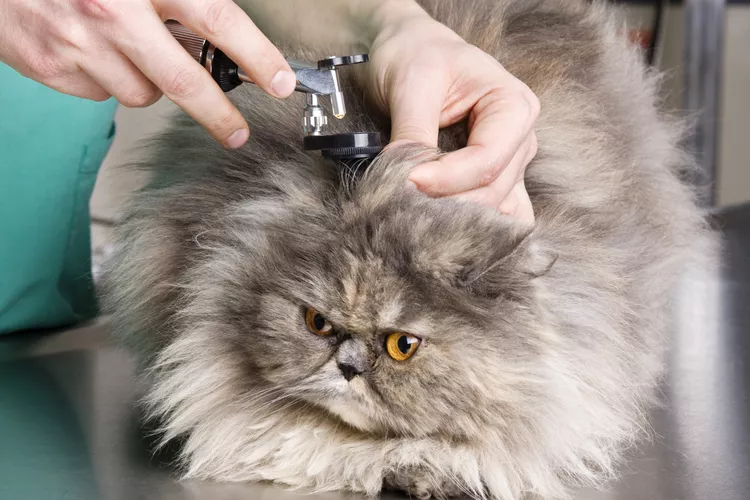
You have probably heard of kennel cough in dogs, but did you know that there is a vaccine for it? Vets commonly refer to this simply as the Bordetella vaccine and recommend it annually for the majority of dogs.
Kennel cough is a basic term used to describe canine infectious tracheobronchitis, an infectious respiratory disease that affects dogs. Kennel cough causes a hacking cough that can last for days to weeks. Most cases resolve with little to no treatment, but others can come severe and lead to pneumonia. Kennel cough is highly contagious and can quickly spread among dogs in close quarters, such as kennels and dog parks. Dogs contract kennel cough either by exposure to an infected dog or exposure to a contaminated surface or object.
There are many types of pathogens that can cause canine infectious tracheobronchitis. Most cases of kennel cough are caused by a combination of pathogens. Fortunately, there are vaccines available for the most common of these.
The DA2PP vaccine provides immunization against adenovirus type 2 and parainfluenza. A separate vaccine is available to immunize against Bordetella bronchiseptica. This vaccine is often referred to simply as "Bordetella" and may be abbreviated as "Bord" in your dog's records.
The Bordetella vaccine is available in three forms categorized by the route of administration.
Most veterinarians recommend the intranasal or intraoral forms over the injectable version because they offer better protection against Bordetella. Many vets reserve the injectable vaccine only for dogs with aggression or extreme aversion to having their faces touched. There is some debate about the intranasal efficacy compared with the intraoral. Some vets prefer the intranasal form because of the additional protection against other agents that can cause kennel cough. Evidence suggests that, while both the intranasal and intraoral vaccines are effective, the intranasal may offer better protection.
Dogs immunized with the Bordetella vaccine can still get kennel cough because of the variety of pathogens that cause the disease. However, vaccination reduces the severity of kennel cough and helps prevents its spread.
Bordetella is considered a non-core vaccine by the American Animal Hospital Association, meaning it may be recommended depending on the dog's lifestyle.
In general, any dog that spends a lot of time around other dogs should get the Bordetella vaccine. This vaccine is required by most boarding facilities, groomers, dog show rings, dog training facilities, and doggy daycare centers to prevent outbreaks.
There is a significantly reduced likelihood of kennel cough exposure in dogs that do not come into contact with dogs outside the household. While these dogs can still get kennel cough through accidental exposure, they are unlikely to spread it due to their lifestyles.
Your veterinarian will discuss your dog's lifestyle with you and help you make an informed decision about your dog's vaccinations.
The Bordetella vaccine is typically part of the puppy vaccination schedule for puppies. It is recommended for most puppies so they will have protection when they start going to puppy classes, dog parks, and other places for socialization.
Most veterinarians recommend the first intranasal or intraoral Bordetella vaccine between eight and 14 weeks of age. The initial vaccine may need to be repeated within two to four weeks for full immunization, depending on the age of the puppy at the time of vaccination and the type of vaccine used.
After the initial puppy vaccines, a Bordetella booster should be given annually, though it may be used up to every 6 months in certain high-risk scenarios..
Every vaccine has potential side effects, but veterinarians agree that the benefits of vaccines outweigh the risks in most cases. Vaccines typically have self-limiting effects. They can cause lethargy, poor appetite, and minor pain and/or swelling at the site of injection. These effects tend to resolve within one or two days.
Vaccines should not be given to a dog with a fever. In general, a sick dog should not be vaccinated until fully recovered from illness. Vaccines are typically avoided in any dog with a history of immune-mediated disease because they may cause the dog to become sick.
Vaccine reactions are uncommon and generally occur within 15-30 minutes of injection. Signs include vomiting, diarrhea, seizures, trouble breathing, facial swelling, and collapse. Bring your dog back to the vet immediately if you notice any of these signs.
Little evidence exists for potential long-term side effects of the kennel cough vaccine for dogs. In general, overvaccination has been associated with an increased risk of autoimmune disease in dogs. However, current vaccine protocols are developed with a goal to reduce overvaccination. Most dogs experience no long-term effects from immunizations.

Tetanus in Dogs
Tetanus is an infection caused by bacteria found in soil. It can cause severe symptoms in dogs and even lead to death if not treated promptly.
8 Common Dog Paw Problems
It is important to check your dog’s paws regularly for any issues and take steps to keep them healthy and protected.
Common Injuries in Dogs and How to Treat Them
Learn about the most common injuries in dogs—whether in their legs, spine, tail, or eye—and how you should treat them with this helpful list.
Can Cats Eat Strawberries? How to Safely Share This Summer Berry
Although cats are primarily meat eaters, strawberries may be an interesting and tasty snack for your feline friend. Find out the risks of feeding strawberries to cats and how to safely let your cat enjoy this fruit.
Is Shrimp Bad For Dogs?
Shrimp can be a healthy, nutritional food for people but can dogs eat them, too? What are the main concerns with feeding shrimp to your dog?
Dog Food Basics
Are you feeding your dog the best way possible? Check out these dog feeding tips to keep your dog healthy and happy.
Rhodesian Ridgeback: Dog Breed Characteristics & Care
The Rhodesian ridgeback is a large hunting dog with a high prey drive. Learn about the breed's history, exercise needs, and more.
Berger Picard: Dog Breed Characteristics & Care
The Berger Picard is a French herding dog with a friendly smile and shaggy beard. Learn about its history, health, exercise needs, and more.
Spanish Water Dog: Breed Characteristics & Care
In the hands of an expert owner, the Spanish water dog shines as an active and faithful companion. Learn about its history, training, and more.
Cat Bunting Behavior: What Does It Mean?
Cats rub their heads against prominent objects to leave scent markings as a part of scent communication.
How to Train Your Cat to Stop Urine Marking
Most male (and some female) house cats will mark territory at some point. Learn the causes or cat urine marking and how to prevent this annoying behavior.
7 Reasons Why Cats Love Bathrooms
Why do cats follow you to the bathroom? Many cats—strangely enough—love the bathroom! Find out why cats seem to love bathrooms so much.
Leptospirosis in Cats
Leptospirosis is rare but potentially fatal in cats. Learn the causes, treatment, and prevention.
Ear Infections in Cats
An ear infection must be treated based on the source of irritation, which may be internal or external. Learn the causes, treatment, and prevention.
Insects That Are Toxic to Cats
Can cats eat bugs? Some bugs can cause injury or illness to your cat, while others are relatively harmless.
Testing for Contagious Feline AIDS (FIV)
Cats should be tested for the contagious feline immunodeficiency virus or FIV. Cats that are positive for the virus usually live normal lives.
Why Does My Dog Pee on My Bed?
Is your dog peeing on your bed? Find out why your dog is having urinary accidents on the bed and learn what to do about it—plus how to stop the habit.
Why Almost Any Dog Can Do Agility Training
Why Almost Any Dog Can Do Agility Training
How to Train Your Dog to Shake Paws
Shaking paws is a fun dog trick that most dogs pick up rather quickly Learn how to train your dog to shake in just a few simple steps.
14 Asian Cat Breeds And Their Rich Hiss-tories
Find out more about the cat breeds that originated from Asia. Some breeds include the Persian, Oriental shorthair, and Japanese bobtail.